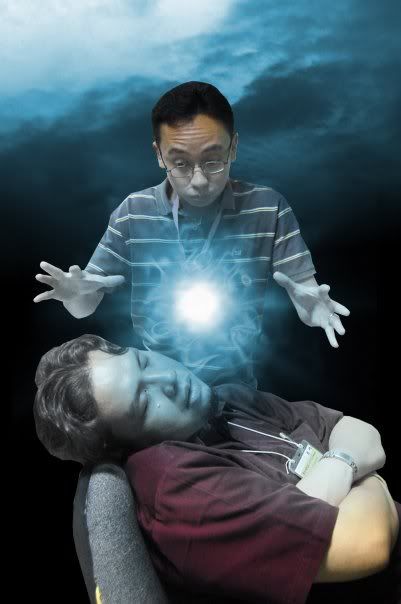
"Spanish football is boring."
And just like that, my best friend Ralph and I launched into a wonderfully antagonistic discussion of the recently concluded World Cup.
Ralph claims that any football team that subjects him to four consecutive 1-0 victories in a row deserve to be flayed with plastic spoons. Oddly enough, that's pretty much how many fans describe the possession-based style that the Spanish used to eventually win the World Cup: "death by a thousand passes".
It is highly likely that the ungodly hours in which Ralph watched the World Cup matches had much to do with his looking at the Spanish team through Homer Simpson goggles:
But really, and it's interesting that someone who regularly views this blog, could have missed the sheer manliness of Spain's feat. As Joe Posnanski observed here:
"It’s precarious to play that kind of soccer because it takes so much talent, so much concentration, so much confidence — one mistake, one good counterattack, one shaky official’s call could make all the difference. Portugal had chances early in the match to take the lead. Paraguay missed a penalty kick. Germany had one brilliant opportunity to score. If any of them put the ball in the net … well, we don’t know how Spain would have responded. Let’s not forget that a not-especially great Switzerland team beat Spain in the first match of the World Cup. To win the Spanish way — by simply dazzling your opponents with brilliant passes and receptions — well, let’s just say it’s soccer played at the highest degree of difficulty."
It is interesting that Xavi, perhaps in retaliation for all the negative press the Spanish team was getting prior to winning the World Cup, shares this view:
"What did people think? That we were going to win every game 3-0? I can't believe what I am hearing sometimes. Do you not realize how hard it is? Teams aren't stupid; we're European champions. They all pressure us like wolves. There isn't a single meter, not a second on the pitch. We are passing faster and faster and faster. We're playing bloody brilliantly. Then there's the pitch and the ball -- I have spent the World Cup thinking, 'That's a good pass,' only to see the ball disappear off in a different direction."
What the Spanish have done, and which I hope my Oranje will emulate, is to dust off the brilliant, flawed experiment that was Total Football and simply reduce it to Football. As writer Sid Lowe observed:
"Much has been said about the weakness of Spain's back four. It's not true. And it's not only not true because Sergio Ramos, Gerard Piqué, Puyol and Joan Capdevila are far better than they are given credit for, but also because they are so rarely exposed. The back four is not a back four but a back 11 -- just as it is a front 10 -- and because for Spain defending starts with the ball.
Put simply: If you don't have possession, you cannot attack Spain. If it controls the game, you cannot cause it problems. When you do get the ball back, there is an anxiety to do something with it immediately that it damages creativity. A tiredness too: "When we did eventually win the ball we were so exhausted from chasing it that we couldn't do anything with it," Miroslav Klose said. Spain had well over 50 percent of the possession against Germany and produced almost 160 more passes; Germany ran 1.2 more miles. No one at the World Cup has had more of the ball than Spain.
The cliché talks about efficiency as if it is a separate thing from aesthetics, and pragmatism as if it is sitting back and kicking the ball long. "Defensive master class" tends to be a tag hung on teams that park the bus. But is that really clever? Isn't Spain's defensive approach even more successful? The Spanish have, after all, conceded just two goals all tournament. Solidarity is seen as everyone fighting together "in the trenches." But what trenches? Spain's solidarity is always having players in the right position, always having options, not losing the ball. Safety first is seen as hoofing the ball miles away. But it is safer to keep hold of it."
Spanish football is both manly and aesthetically pleasing. If it seems a bit too pretty, or self-assured, it's probably because it's the only football in the world that can produce this on a regular basis, at the highest level of play:
Ralph, you're wrong. But then a lack of sleep could do that.

1 comments:
Ey coach,
I've long been a fan of defensive Italian football. Which is the exact opposite of "Football" the Spanish way.
In this respect i agree with your sentiments, you really can't score if you don't have the ball.
Italian football is the exact opposite. They lay back and rely so much on their spirited defense, which is probably why Italy has produced arguably the best defenders in the world over the years (Baressi, Maldini, Canavarro etc). The need for stalwart defenders arose from their being under constant pressure at the back. I must say they've also mastered the art of the sweeper (see Canavarro).
Italian football also gave rise to superstar Italian strikers like Baggio. Italy, holding the fort with their impressive defensive line would simply blast a long ball to their talented strikers who would have to score 1 against 4 on the counter.
If Spain had a lineup full of controlled, diminutive ball handlers to retain possession and then score when the opposition finally gave way, Italy's train of thought is the exact opposite: frustrate the opposition at the very gates of their city, only to counter attack with talented strikers or wingers charging down the sidelines. Different philosophy, but note, one that won the cup only 4 years ago.
Post a Comment